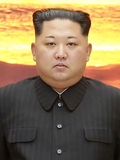| |||||
| Centuries: | |||||
|---|---|---|---|---|---|
| Decades: | |||||
| See also: | Other events of 2024 Years in North Korea Timeline of Korean history 2024 in South Korea | ||||
The following is a list of events from the year 2024 in North Korea .
| |||||
| Centuries: | |||||
|---|---|---|---|---|---|
| Decades: | |||||
| See also: | Other events of 2024 Years in North Korea Timeline of Korean history 2024 in South Korea | ||||
The following is a list of events from the year 2024 in North Korea .
| Photo | Position | Name |
|---|---|---|
 | General Secretary of the Workers' Party of Korea | Kim Jong Un |
 | Chairman of the Standing Committee of the Supreme People's Assembly | Choe Ryong-hae |
| Premier of North Korea | Kim Tok-hun (until 29 December) | |
 | Pak Thae-song (since 29 December) |